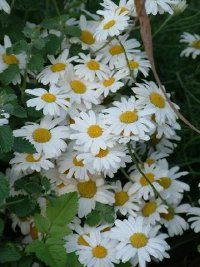Diuretic herbs can help take care of fluid retention and the feeling of bloat that often accompanies menstruation. Parsley, dandelion, hydrangea, angelica, and horsetail all have diuretic properties. Drink infusions or decoctions of these herbs.
Breast tenderness, skin blemishes, and cravings are typically caused by hormone imbalances. Chinese angelica, or dong quai, helps to stabilize hormone levels. One method is to mark on the calendar the time in your cycle that you experience these symptoms. Start taking tea or tincture of dong quai several days before the anticipated problem time. Stop taking dong quai as soon as your period starts.
Painful menstrual cramps are a frequent complaint; antispasmodics are invaluable for repressing them. Herbs that have a particularly good reputation for easing menstrual cramps include black cohosh, valerian, wild yam, yarrow, chamomile, and feverfew. Make decoctions or infusions of these and start drinking them a day or two before you expect cramps to start; take every two hours during the most acute phase.
Red raspberry leaves tone the uterus and also help prevent menstrual cramps. This herb needs to be taken consistently over a long period of time to get this benefit. If menstrual flow is heavy, red raspberry leaves will help control it. Yarrow is also instrumental in reducing excessive menstrual flow. Use tea or tinctures several times per day.
If you have the opposite problem, very light periods, and you need to increase menstrual flow, angelica can coax the situation. This herb will also help regulate the menses. The underlying cause of heavy or light periods should be determined before using herbs. Consult a holistic practitioner.
Several herbs contain oils that have proved very beneficial in reducing PMS symptoms. The herbs can be grown in your garden, but it takes commercial preparation to get enough strong oil from them. Evening primrose, black currant, and borage contain gamma-linolenic acid (GLA). Three thousand milligrams of evening primrose oil per day, taken in divided doses, alleviates many PMS symptoms for some women. Begin taking this ten days before menses are expected to start.
Traditionally, evening primrose is eaten as a food and may be helpful if eaten frequently. It is just one of many herbal remedies that can be used to treat the often uncomfortable side effects of menstruation -- some of which may offer you relief.
